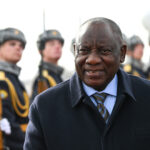The Brazilian president, Luiz Inácio Lula da Silva, cancelled his trip to Russia for the Brics summit after a fall at home caused a minor brain haemorrhage.
Brazilian newspaper reports say the president has had five stitches because of the accident.
Two doctors from the hospital are set to regularly check on Lula’s recovery.
In a statement, the presidential office said Lula, 78, would participate via videoconference. He was initially scheduled to depart for the summit at 5pm on Sunday.
Doctors said the president sustained ‘great’ trauma to head and slight brain bleed. They suggested he cancel long-haul travel as a precaution but said he was otherwise fit for duty.
Lula’s doctor, Roberto Kalil, said in an interview with GloboNews TV channel that the president had a fall that caused “great” trauma to the back of his head, requiring stitches and resulting in a “small brain haemorrhage” in the temporal-frontal region.
“It’s a condition that will require repeat tests th/roughout the week. Any brain haemorrhage, theoretically, can worsen in the following days, so observation is important,” Kalil said, adding that Lula was doing well and could engage in normal activities.
According to a medical report issued earlier on Sunday by the Sirio Libanes hospital in Brasília, Lula suffered a laceration to the “occipital region” of the back of his head on Saturday.
The report said Lula “was advised to avoid long-distance air travel but is otherwise able to carry out his regular duties”.
The government announced that Mauro Vieira, the foreign minister, was designated to lead the Brazilian delegation to the Brics summit, departing on Sunday.
Gleisi Hoffmann, a congresswoman and president of Lula’s Workers party, said she had spoken with the president and that “he is doing very well, just avoiding a long trip”.
Not yet clear if Saudi Arabia attending
While Russia last month invited Saudi Crown Prince Mohammed bin Salman to attend the Oct. 22-24 BRICS summit, the Kingdom has yet to confirm its formal alignment with BRICS. Most likely, Saudi strategists are still weighing all pros and cons of membership—with factors in favor and against broadly balanced.
Economic considerations that might push Saudi Arabia towards BRICS as the bloc represents a huge market: the expanded group of countries will represent 45% of the world population and 28% of global GDP, uniting its members with a high level of mutual economic cooperation.
Core members (Brazil, Russia, India, China, and South Africa) are responsible for approximately 40% of the new BRICS members’ exports and imports. In the case of Saudi Arabia, this figure is 30% and steadily growing—along with a positive trade balance for the Kingdom. Of further note, this trade volume has long since surpassed that with the main political ally of Riyadh, namely the United States.
Mindful of certain setbacks, there is also a growing inflow of investment in the Saudi economy from the core BRICS countries. These capital inflows are playing an important role in the Kingdom’s attempt to transform its economy.
According to Bloomberg, Saudi Arabia has already launched 1.3T USD in “real estate and infrastructure projects over the past eight years as part of its plan to diversify the economy away from oil”—and more will come. Given the size of investments needed, sole reliance on its own oil income is not a solution for the Kingdom.
Moreover, while western investors might be doubting the necessity to deal with the Saudi economy at a time of change and global economic instability, China and India as well as other non-western countries have clearly shown their readiness to work with Riyadh, including on projects targeted at the development of the green and sustainability-related sectors.
BRICS membership could further support the Kingdom’s positions on the global oil market.
However, BRICS membership also comes with potential risks, particularly regarding political entanglements. Aligning with a group that includes Russia may embroil the Kingdom in the ongoing geopolitical tensions between Moscow and the west. Similarly, the rivalry between China and the US could complicate the Saudi diplomatic balancing and have a negative domestic effect.
According to one recent poll, almost half of Saudis prefer closer cooperation with the US and its allies rather than China. In this sense, the US presidential elections next month add even more agitation. The potential return of Donald Trump to the White House might increase China-US tensions and backfire on Saudi-US relations should Riyadh formally join BRICS.
Meanwhile, the US remains the unrivalled defense partner and arms provider for Saudi Arabia. The Kingdom was the world’s second-largest arms importer in 2019–23, with the US supplying 75% of the weapons. Riyadh’s extensive cooperation with the west on security and military matters may make BRICS membership a precarious choice.
Another potential drawback is the loose structure of BRICS itself. Divergences between member nations, such as the India-China rivalry, complicate the bloc’s ability to form a unified stance on critical international issues. Moreover, it remains unclear why Saudi Arabia should prioritize formal BRICS membership as its main platform for engaging key partners.
The Kingdom has effectively built economic and political relations through bilateral channels, making BRICS membership seem more symbolic than necessary. Most of Saudi Arabia’s objectives can be achieved directly, and its selective participation in BRICS-related events already reflects a form of de facto involvement. This approach allows the Kingdom to align with its interests while mitigating potential risks with the west, which sometimes views BRICS as an adversarial bloc.














Your point of view caught my eye and was very interesting. Thanks. I have a question for you.